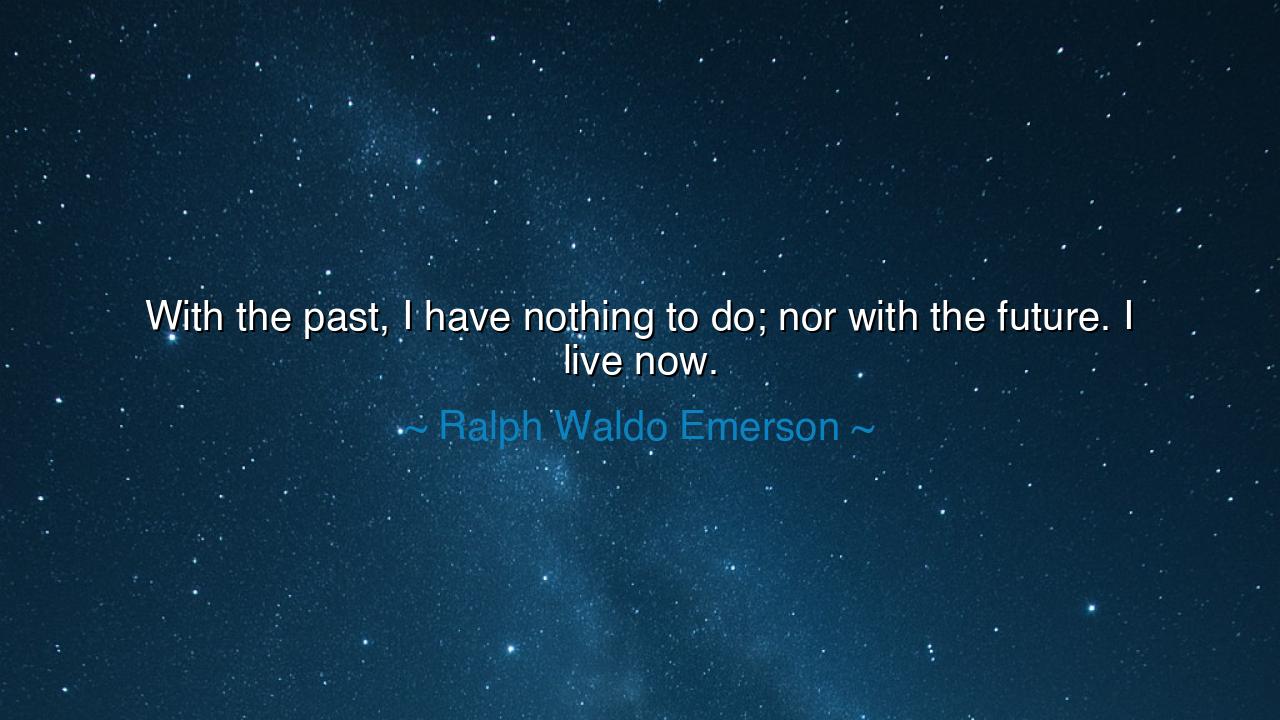
With the past, I have nothing to do; nor with the future. I live






In the great river of life, there are currents that pull us backward into the past and others that try to push us forward into the future, but as Ralph Waldo Emerson so powerfully declared, "With the past, I have nothing to do; nor with the future. I live now." His words speak to the timeless truth that the only moment we truly possess is the present. The past, with its memories and regrets, and the future, with its worries and uncertainties, both stand as distant lands. Yet it is in the now, in the fleeting breath of the present, that we must truly live, for it is only in the present that we have the power to act, to create, and to experience the world as it truly is.
The ancients understood this profound lesson. The Greek philosopher Epicurus believed that true happiness and peace could only be found in the present moment. His teachings encouraged individuals to free themselves from the constant pursuit of what was past or what might come, instead focusing on cultivating a life of simple pleasures and self-reflection in the now. Like Emerson, Epicurus saw the human tendency to obsess over the past and future as a barrier to true contentment and freedom. The wise, according to Epicurus, would learn to embrace the present, where joy is found not in regret or anticipation, but in the acceptance of the world as it unfolds before them.
Similarly, in the ancient Indian tradition, the concept of “living in the moment” is enshrined in the teachings of the Buddha. The Buddha, in his search for enlightenment, emphasized the importance of mindfulness—the ability to be fully present and aware in each moment. He taught that attachment to the past or anxiety about the future only led to suffering, while true liberation came from embracing the now with a clear, undistracted mind. The Buddha’s path to nirvana was one of detachment from the illusion of time, encouraging his followers to experience the present as a way of freeing themselves from the constraints of worldly suffering.
Consider also the Roman Stoic philosopher Seneca, who, though born into a life of political intrigue and turmoil, wrote extensively on the nature of time. In his essay, On the Shortness of Life, Seneca poignantly reflects on how many waste their lives chasing after past regrets or future ambitions. He wrote, “It is not that we have a short time to live, but that we waste a lot of it.” Like Emerson, Seneca urged us to focus on the now, for it is the only time that is truly ours. The future is uncertain, and the past is gone, but how we spend our present shapes the world we create.
The story of Alexander the Great offers another vivid example of how living in the moment can lead to greatness. While his ambitions to conquer the known world were vast, he was often noted for his ability to make decisions swiftly, focusing on action rather than getting bogged down by past defeats or future uncertainties. Alexander lived boldly in the present, seizing every moment to move forward with purpose, often ignoring the distractions of what might come or what had been. His success lay not just in his strategic genius but in his refusal to be overwhelmed by the weight of time, focusing instead on immediate action.
Emerson’s lesson, like that of the ancients, calls us to release the burden of what is past and the anxiety of what is to come, and to live fully in the present. It is only in the now that we can make a difference, in our own lives and in the world around us. The act of living in the present is a form of empowerment, for it is in this moment that we possess the strength to change, to create, and to build the life we desire. The future, though uncertain, will be shaped by the decisions we make now, and the past, though heavy with memory, cannot be changed, but only learned from.
The lesson Emerson imparts is not one of neglecting the past or dismissing the future. Rather, it is a call to freedom, to the idea that we must not let our lives be consumed by what was or what might be. We must learn to focus our energy on the present, for it is in the present that action happens. The past can provide us with wisdom, the future can offer us hope, but it is the now where our true power resides. In every moment we choose to act, to live, and to be fully present, we create a future that is more meaningful and a past that is rich with experience.
Therefore, let us learn to live with intention in the now. Let us give our attention to the moment before us, fully embracing the opportunities that present themselves in every breath, every step, and every choice. The ancients knew that the present is where life truly happens—where change begins, where growth occurs, and where meaning is found. May we follow in their footsteps, understanding that by embracing the now, we do not only shape our own lives, but the future of generations yet to come.






AAdministratorAdministrator
Welcome, honored guests. Please leave a comment, we will respond soon